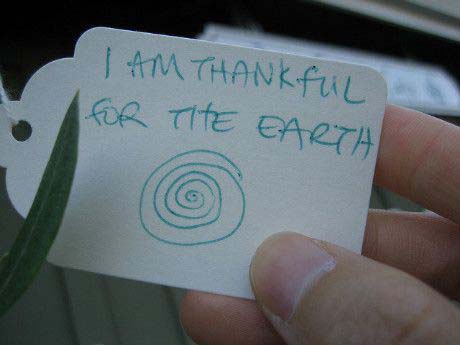Thanks: Depth Psychotherapy, Positive Psychology & Gratitude

Canadian Thanksgiving is a time for gratitude for the good things in our lives, and a good opportunity to examine the subject of positive psychology and gratitude.

Positive psychology is a movement in psychology in recent years that, among other things, emphasizes the importance of gratitude and giving thanks to create psychological strength and a sense of well-being. From a /a-midlife-transition perspective, what are we to make of this?
Positive Psychology
Positive psychology focuses on personal growth rather than on pathology, which, unfortunately, some approaches tend to emphasize. Depth case studies, especially Jungian approaches, would whole-heartedly concur with this emphasis.
Positive psychology also emphasizes that humans are more often drawn by the future than driven by the past. Jung would agree. He was always curious about what was trying to develop in a person’s life.
So, much in common. But /a-midlife-transition and positive psychology differ somewhat in their attitudes toward happiness and fulfillment, and in the attitude of positive psychology toward gratitude.
Gratitude and “Mental Strength”
Some emphasize that cultivating the habit of gratitude yields positive psychological benefits. It’s not uncommon to find supporters of positive psychology saying things like “Grateful people measure as happier, as having more social connectness, and as experiencing less depression. Adopting an attitude of gratitude leads to genuine benefits.” The suggestion is that one should be grateful because of all the benefits that being grateful will bestow.
Some who embrace positive psychology also suggest that it’s important not “feel sorry for yourself”. Avoiding this will apparently bring positive gain.
I’ll admit that this “not feeling sorry for yourself” thing pushes a personal button of mine. I grew up in a home where the phrase “Don’t feel sorry for yourself!” was employed very liberally. It took me decades to figure out that the phrase was actually code for…

DON’T. FEEL. ANYTHING.
Genuinely feeling gratitude is important. However, to use gratitude to block other equally valid feelings, such as sadness, frustration, anger or grief would thwart psychological wholeness. Feelings exist for a reason, and they need to be acknowledged. As Jung put it, “Where wisdom reigns, there is no conflict between thinking and feeling.”
Also, using gratitude as a way to generally feel better in life doesn’t really acknowledge the true psychological role of gratitude. Gratitude is a perfectly valid and important emotion, but only if it spontaneously arises from the particular situation in which I find myself. The same is true of all emotional states. I shouldn’t try to use gratitude to feel good all the time, anymore than I should be using sexual arousal to feel good all the time. Each emotion has its place; “to everything there is a season”.
What is Genuine Gratitude?
We only experience gratitude in contrast with things for which I can’t possibly be grateful. Humans have many difficult, painful experiences. To suggest that others should be grateful for these experiences would almost be to mock them.

Genuine gratitude comes from the authentic self. When others, Life, God or the Universe give us something to which we respond in joy and thanks, something in us opens; we know we haven’t “whipped up” this feeling. Like numinous awe, experiences of gratitude come from a sphere outside of the realm of the ego and its projects. The psychology of the unconscious identifies gratitude as coming from the larger personality beyond the conscious control of the ego.

Where am I Grateful?
Thanksgiving has parallels in almost all cultures and religious traditions, and entails examining our lives for those things for which we feel genuine gratitude. From a /a-midlife-transition perspective, it’s essential to acknowledge those places where life comes to us as a simple and genuine gift. I wish you and those you love a very Happy Thanksgiving.
Brian Collinson, Registered Psychotherapist & Jungian Analyst
[cta]
PHOTOS: 
 © Eugene Kim ; Ryan Vaarsi ; Robert Anthony Provost ; StarMama
© Eugene Kim ; Ryan Vaarsi ; Robert Anthony Provost ; StarMama
© 2015 Brian Collinson, 2238 Constance Drive Oakville, Ontario (near Mississauga)
